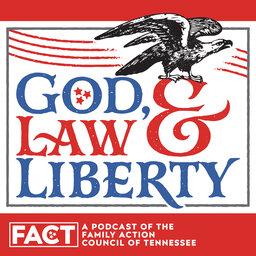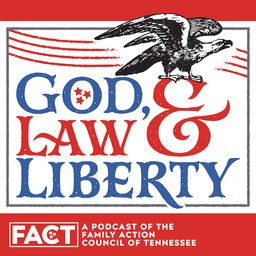


God, Law & Liberty Podcast
Playlist by God, Law & LibertyGod, Law, and Liberty is a podcast featuring David Fowler, a licensed attorney, who served 12 years in the Tennessee Senate and, until retiring at the end of 2024, served as president of the Family Ac…Follow the podcast:
316 clip(s) in playlist

What Makes the Dominion of Sin (and Grace) Objectively Real?
This week Jason Farley returns to lay the final jurisdictional footer for building a Christian understanding of God's law, its purpose, and how it informs the way Christians use the jurisdiction God has given them in the legal and policy spheres. Find out why the key to understanding the two object…
14:22
What Makes the Dominion of Sin (and Grace) Objectively Real?
This week Jason Farley helps me lay the final jurisdictional footer for building a Christian understanding of God's law, its purpose, and how it informs the way Christian use the jurisdiction God has given them in the legal and policy spheres. Find out why the key to understanding the two objective…
14:22
Have Evangelicals Failed the Free Exercise Clause Test?
Today David explains why he said last week that the use to which evangelicals have put the U.S. Supreme Court’s interpretation of the Free Exercise Clause “diminishes the glory of Christ respecting what Christ accomplished on the Cross.” Find out how evangelicals failed to deliver what the Founding…
11:27
Special Edition: Christian Liberty (Puritan style) v. SCOTUSs "Religious Acts"
Special Edition: Last Friday, I said I thought the use by evangelicals of the U.S. Supreme Court’s Free Exercise Clause emphasis on “religious acts” to mean protection for certain for civil conduct “diminishes the glory of Christ respecting what Christ accomplished on the Cross.” The following quot…
07:55
The Protestant Doctrine that Explains the Free Exercise Clause
What is the relationship between the protestant understanding of the doctrine of original sin and the purpose of First Amendment’s Free Exercise of Religion Clause? The U.S. Supreme Court's failure to consider that doctrine has made its interpretation of that clause wrong. But I believe its interpr…
15:32
Have We Overlooked a Most Important Law?
I offer the following brief explanation of Romans 7:20-21 by John Owen from 1667 that I hope provides a better understanding of the effect we can expect the “dominion of sin” to have on our political endeavors and will lead to a better understanding of tomorrow’s important episode about the true pu…
06:40
Making Biblical Sense of the Mess in Minneapolis
Why are large numbers of people in Minneapolis, many educated, choosing to do things that to many of us just don’t make sense? Is Christ, the prophet to His Church, revealing something to His people? If so, what is it? Is the answer something more than "Sinners sin"? I think so. It may be controver…
14:26
Richard Dawkins and a Calvinist Agree?!
In this 4 minute special edition, find out why Richard Dawkins, the atheistic evolutionary biologist, and a strict Calvinist, J. Gresham Mechen, agree on one thing: Certain Christians have abandoned Christianity. It shows up in how we approach the transgender issue in law and public policy.
04:17
An Overlooked Heresy in the Christian View of Law and Politics?
Today I discuss how a heresy I unwittingly embraced affected what I thought my 30 year engagement in law and politics could accomplish. Do you think my description of that heresy and its application is dominate among evangelicals and Roman Catholics? I do, and explain why.
14:54
Why Educated People Don't Know What a Woman Is
Our society and law have progressed from prohibiting access to contraceptives in 1879 to a Supreme Court argument this week about human sexuality to U.S. Senator Josh Hawley asking a Doctor if a man can get pregnant. Why has this "evolution" occurred and gone in only one direction? And why don't we…
14:08
 God, Law & Liberty
God, Law & Liberty